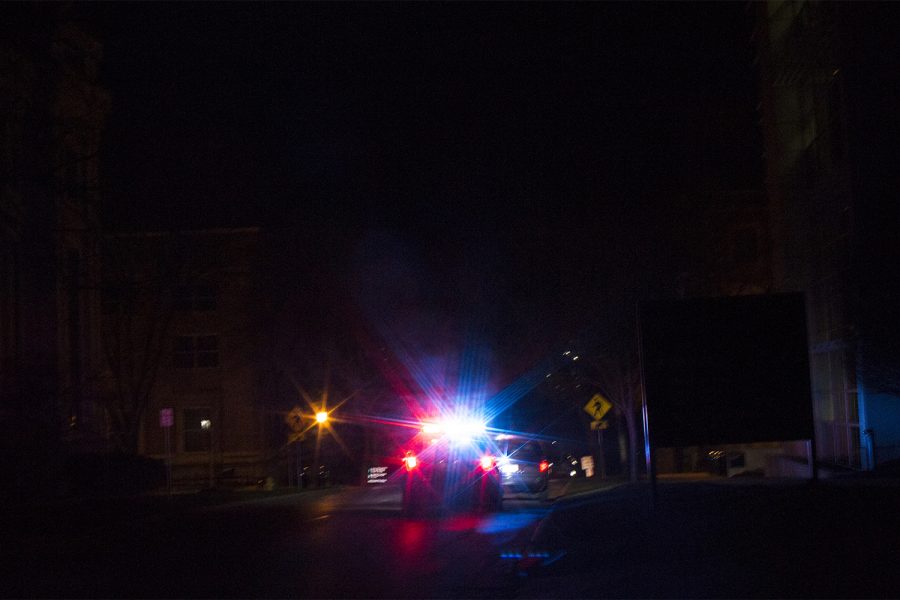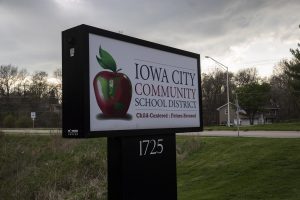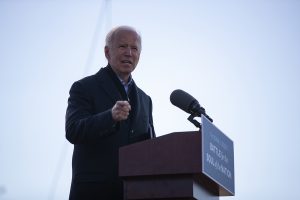City Council will use individual community leaders to gather diverse public input
Taking a unique approach to collecting and reviewing public input, the Iowa City City Council is looking to hear from a wide range of community members to make appropriate changes to policing in Iowa City.
File photo of a police cruiser.
February 1, 2021
The Iowa City City Council is trying to solicit feedback on its preliminary plan to accelerate community policing introduced in December, hoping to find avenues outside of regular meetings to find public input.
City Manager Geoff Fruin said the city council is seeking input from a diverse range of community members in Iowa City to appropriately tailor future changes to the police department that will best serve the entire city.
One way of doing that, Fruin said, is using independent, designated community members collecting input from their individual community within Iowa City and relaying input to the council. At the council’s work session on Jan. 19, Fruin recommended the city hire a liaison for the immigrant and refugee communities in Iowa City.
These specific community leaders, he added, will also be financially compensated for this service.
“We have a large and growing immigrant community here in Iowa City, and our traditional processes may not be very effective at capturing input from that community,” Fruin said. “So, what we’re trying to do now is find a contact within that community — find somebody that is trusted in that community — that maybe can speak multiple languages that can gather that input for us and bring back a summary of that input that the council could consider.”
The city’s police plan was part of the 17 point Black Lives Matter resolution the council passed in June. The plan calls for hiring new positions to work with certain communities, like a victim service specialist, a street outreach coordinator, and a community outreach assistant. It doesn’t suggest removing any funding from the department.
RELATED: Iowa City considers 2.5 percent police budget increase with new outreach staffers
The plan also recommends hiring a liaison between CommUnity Crisis Services and Food Bank and the police, in order to facilitate the plan’s recommendation to divert calls away from law enforcement and toward crisis services like CommUnity.
CommUnity Marketing & Communications Manager Nicole Kilmer wrote in an email to The Daily Iowan that the organization plans to present in front of the city council on Feb. 2, voicing its opinions and recommendations for this preliminary plan.
During a Jan. 19 city council work session, Fruin said that he, Mayor Pro Tem Mazahir Salih, and City Councilors Laura Bergus and Janice Weiner had decided the city should have more creative ways to solicit feedback from the public for the plan.
“We talked about some of the traditional ways that we would go about getting public input,” Fruin said. “Whether that’s through public meetings, community surveys or things like that, and we just felt that a different approach was needed this time around.”
Bergus said the city council is prioritizing feedback from all members of the community, especially those who historically have not had the easiest time providing structured input to local government officials and are often most impacted by policing.
The first 40 pages of the 250-page document — the summary of the preliminary police plan — will be translated into Spanish, Arabic, and French, costing the city about $9,000.
Fruin said this plan is not finalized, and he doesn’t think it ever will be, as the conversation about changing and improving community services such as policing is constantly evolving. He said he believes the plan should evolve, accordingly.
Bergus said there is not currently a definite timeline in place for the plan, for which there are both drawbacks and benefits to.
RELATED: New city proposal could increase transparency for complaints filed against Iowa City police
She said with this recent push in conversation surrounding community policing, she has run into difficulties when looking for other cities to base this plan off of.
“As far as my expectations, or a timeline, I don’t know, I think it’s the kind of thing that we have to stay on top of it,” Bergus said. “But … we don’t want to just shortcut it, right? We don’t want to rush it. And I think it would be really, I mean, frankly, it would be really easy to do that. And, you know, as someone in the policymaking role, I’ve been really struggling in looking at what other cities have done or are doing.”
Along with using this wide range of feedback to improve policing, Fruin said he thinks that establishing these relationships within the community will help improve the council’s feedback collection process for many different public services in the future.
“I think the hope is that we can be really effective at engaging a very wide cross section of the community and not just in the short term, but that we can use this as a platform for building some long-term connections and long-term relationships that will help us continually evaluate our services,” Fruin said. “I think the benefits go well beyond policing if we can successfully establish and strengthen some of the relationships that we have, and we can gather valuable input on other city services as well.”
At the last two city council meetings, several people spoke during public comment periods to oppose both the preliminary police plan and the city’s upcoming budget, which includes a 2 percent increase to the police budget. Protesters who spent the summer calling to defund the police said the plan doesn’t do enough to reallocate police funding to social services.
David Drustrup, a supporter of the Iowa Freedom Riders — the group that led the summer protests which gave rise to the police plan — and a doctoral candidate at the UI, said during the Jan. 19 council meeting that future attempts to solicit public input won’t be effective if the plan doesn’t take that input into account.
“The proposal from the city manager just ignores the things that most of the folks were asking for during those listening sessions,” Drustrup said, referring to listening posts the council held while crafting the original plan. “So, unless the council confronts that fact, there’s no reason for us to trust that all of a sudden our feedback is going to matter this time around.”






